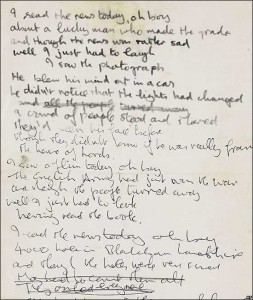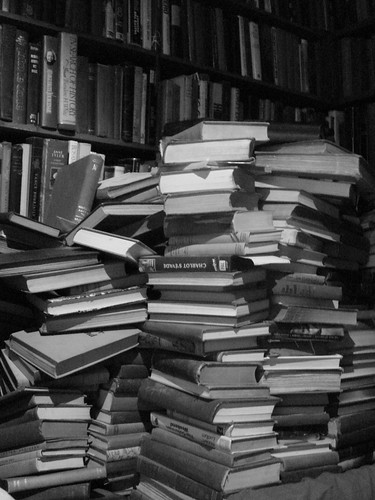 I’ve often thought about what my influences are in writing. Some people watch a movie or read a book and think “Hey, I wish I had written that.” Others think “Gosh, I could have written that!” In fact, some stories are so good, or so impactful and resonate so well with what is churning in your own mind, that you think “Gosh – I need to write MORE of that!”
I’ve often thought about what my influences are in writing. Some people watch a movie or read a book and think “Hey, I wish I had written that.” Others think “Gosh, I could have written that!” In fact, some stories are so good, or so impactful and resonate so well with what is churning in your own mind, that you think “Gosh – I need to write MORE of that!”
I can’t tell whether exposure to literature and film created my worldview, or if some primeval dystopian conspiracist reincarnationist ideas were merely activated and given form by the media I was exposed to. In either event, I’d love to detail a few of the influences that inform my writing.
Old School
When I was in 6th grade I think it was, I was too young for my parents to let me watch a violent film like Terminator. And yet my best friend turned me on to it, by sitting in the library with me and explaining the plot, beat for beat, to me. (Am I the only one whose exposure to the Terminator myth began through oral culture?) The story resonated because of the time travel. But if you look at it, time travel is a great plot device to explore consequences of actions over time. And these consequences go down for the ages.
Of course another time travel movie became wildly popular in the 80s, Back to the Future. This movie explored not only time travel but also generations, how families grow over time and pass on their values, beliefs and culture. The juxtaposition of then and now serves not only to advance the story, but as a compressed-time metaphor for exploring how EVERYTHING that happened before now is leading up to THIS INSTANT and our actions within it.
One of my teachers, a Kenneth Haker, AP US History, had us watch a film. It was The Manchurian Candidate. It’s a cold-war film about mind control and sending soldiers back to the US who have been mentally reprogrammed to assasinate. We were told I think that Sinatra (who stars) was against it’s continued release in light of Kennedy’s assassination (there was no snopes.com at the time to disprove this false fact). This experience set me searching for other material about this. Even if you view swinging watches and queen of hearts and post-hypnotic suggestions as a bunch of hooey, the success of the advertising industry should tell you that mind control *can* work…
It Never Works Out
Of course like every high school student in America (I assume), I was exposed to Animal Farm at some point. It’s a great book, and my main take-away was that they change the rules over time. Lord of the Flies taught me that even in democracy, the majority will eventually vote to eliminate human rights. But Brave New World is by far the most impactful and influential of these novels to me. From it I learned that you will be rewarded, in our culture, for giving up your power of choice.
Going Back in Time
Now, when I was in my mid teens, I had an interesting experience. After some soul searching about what I wanted to do with my life, I became fascinated with the possibility of past lives. What if you somewhat unexpectedly and suddenly remembered with clarity and specificity, who you were in a past life? What if you had memories of just the same quality as your normal memories, experiences were just as profane or mundane as now? What if you could see how the incomplete projects you had started in your last life had simply spilled into your current life? This would certainly make you into somewhat of an oddball. You’d probably have some urge to talk to people about it, yet feel like you couldn’t. It’s not like you would believe in past lives – you wouldn’t. You would simply have memories, as vivid and detailed as your current memories, such as driving such-and-such a car, and being friends with so-and-so, and wanting to live in a certain part of town, but living in another part. You might even remembered how you died. Should you believe these memories? Ah, another film, Total Recall and numerous others in the amnesia-through-drugs-or-mind-control explores these tropes and helps us understand the answer to that dilemma. Around this time as well as later, I was also exposed to the Highlander movie and series. This theatrical device – an immortal, who sort of “hides out” and keeps changing identities – is another fantastic metaphor that touches on the problems of reincarnation without getting bogged down in ‘reincarnation’ or Samsara as it is understood in Eastern culture.
But how weird was my interest in past lives? I find some solace in the fact that today, on Earth, at least a billion people, perhaps 1.5 billion believe in past lives. And a few billion more – the vast majority – at least believe in future lives. (Source: CIA World Factbook. No joke, look it up.) Even the much revered and respected Dalai Lama knows that talking about his past lives may be too much for people, and he downplays their significance in interviews.
It’s a Conspiracy
I have read countless ‘rational’ and ‘skeptical’ articles attempting to debunk conspiracy. And yet, for every one of these authors, no matter how many individual fallacies they point out, I still think they are whistling in the dark. I think their approach to explaining the chaos of the world is to say it just isn’t that complicated, resorting to Occam’s razor and all that, glosses over the fact that sometimes the world IS dark and sinister and very, very complicated.
One of the earliest introductions to this fact was actually not fiction, but the true stories of American double agents in WWII Germany. I read about double agents; in this case, working for the British but trusted by the Germans, they had to let real Allied troops die, and had to give good, actionable intelligence to the Germans to build that trust. This fact made me realize that the game of war and of life really, can get so very existential and complex, that the loyalties can get so perverted and converted that you don’t know what to do any more. And it taught me that the real truth can, after a “reveal”, be startlingly different than what you thought it was.
The stark verisimilitude of LeCarré’s The Spy Who Came in from the Cold, the best spy novel of all time, only confirmed my sense of how the world runs.
My history studies of the 60’s contributed to this view. We know the Warren commission said it wasn’t. And we know that Bobby Kennedy’s death was yet another lone agent. And so were all the others. And after a while, after so many events, the rationalist will try to talk you down from trying to draw conspiratorial conclusions. “It’s a human need to explain things”, they will explain. “Your mind wants to make sense of all this, fit it into a pattern”. To hell with this rationalist. There is an order to this chaos. We know now about the FBI hounding MLK, John Lennon, anyone they don’t like. We know about Nixon’s lies.
Perhaps it’s not the lizard people, perhaps it’s not the UFOs, and perhaps it’s not the dirty dozen, but to deny the fact that evil men conspire to create evil effects in our world is to be in denial.
Why I write
The novels I am writing are reincarnationist, because I simply find it fascinating and under-explored in the fiction of Western civilization, and of course I’m weird. The novels I am writing are conspiratorial, because in trying to make sense of the chaos of the world and all the broken plans of man, my mind feels compelled to weave it into a logically consistent and explanatory conspiracy.
My exposure to Huxley’s Brave New World (and the irony of his dropping acid on his deathbed and trying to achieve some sort of agnostic spiritual ascent) informs my complex anti-drug spirituality.
Possibly the real reason I am writing about it because, like Woody Allen, “I don’t want to achieve immortality through my work; I want to achieve immortality through not dying.”
But think about your writing in this light. Immortality is a tricky thing to understand. Yet there are writers from thousands of years ago, whose ideas we still discuss every day. Greek philosophic ideas, various sacred testaments, and the Veda permeate and shape our culture, often more powerfully than the artists of today.
Who knows – perhaps that poem in school you hated having to study was something you wrote long ago!
But whatever you write, know that it can echo down the ages, affecting people, changing their minds, and imbuing them with the energy that was your life.


 Recently I’ve been sampling some commercially-focused writing education. While high school and college classes presented what I consider a sort of forensic, after-the-fact approach to literary analysis, how-to-write books tend to focus on how to generate a prizewinning or commercially successful novel or screenplay.
Recently I’ve been sampling some commercially-focused writing education. While high school and college classes presented what I consider a sort of forensic, after-the-fact approach to literary analysis, how-to-write books tend to focus on how to generate a prizewinning or commercially successful novel or screenplay.